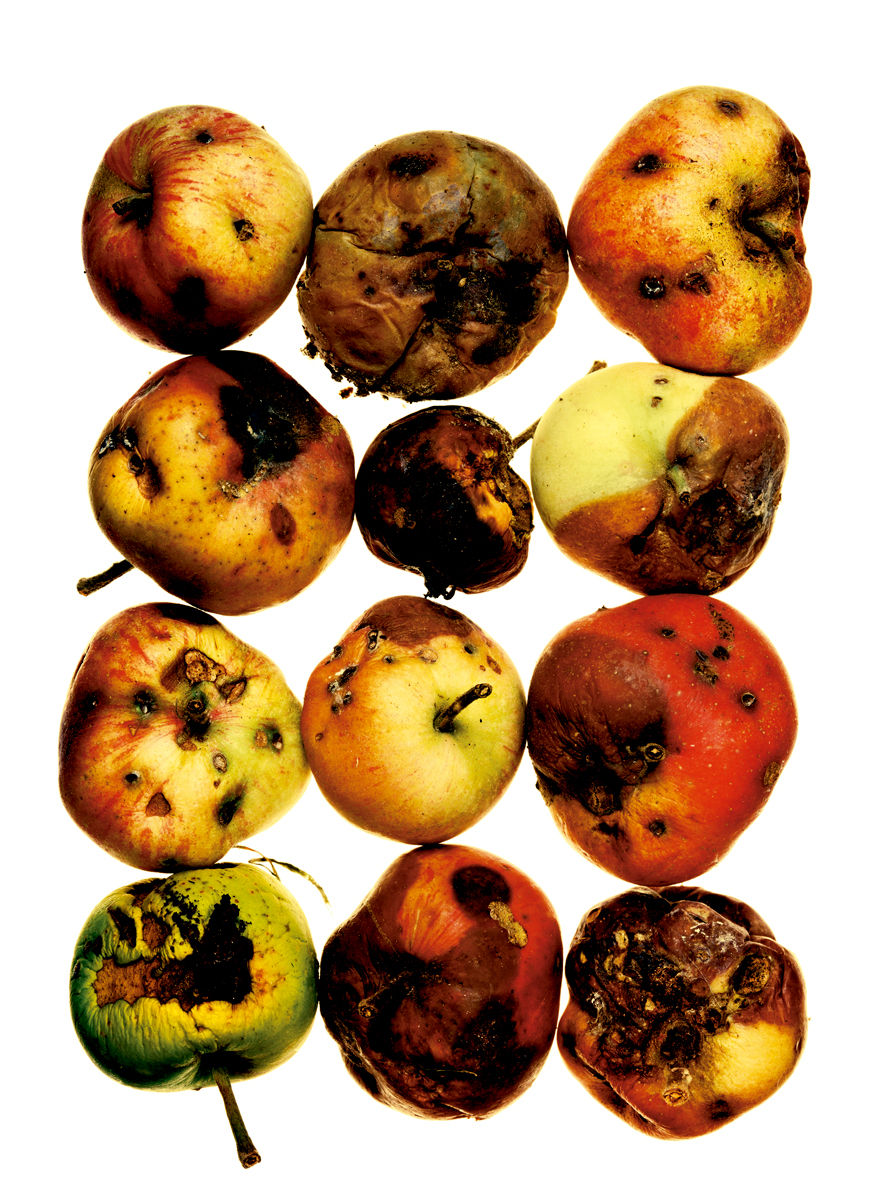I’ll be very honest… Those who waste food don’t deserve to be alive. I’m kidding. It was just to get your attention. Now that I have it, I can write what I had in mind. Don’t waste food.

© Irving Penn
© Irving Penn
I’ll be very honest… Those who waste food don’t deserve to be alive. I’m kidding. It was just to get your attention. Now that I have it, I can write what I had in mind. Don’t waste food. The reasons why are so obvious I won’t waste a single minute naming them. Better to cut to the chase and jump to the solutions. That depends, as usual, on each one of us.
There is a meme (this sort of modern cartoon and one of the best things to ever come out of the Internet) that encapsulates the irony of this world: above a picture of Stalin smiling, one could read “dark humor is like food. Some have it, some don’t.” At first, it’s simply genius. Because it is dark humor justifying itself. But when you really think about it, it’s much more than that. There is a sense of refinement here that is atrocious, at the very least. Stalin remains historically accused of being responsible for causing The Terror-Famine, or Holodomor, inflicted on Ukraine between 1932 and 1933. The then Soviet province considered the “Barn of the URSS”, was forced, via de collectivization of agriculture, to surrender their crops and cattle to feed the great cities. As a result, around three million Ukrainians died. Paradoxically, almost a century later, it is the withstanding economical regime, against which the communists were rebelling, that dictates The Terror-Famine. When faced with the inexistence of a political dictatorship, capitalism waves with one hand to the few dozens of humans that hold the richness of the world while, and with the other, it flips the millions that perish due to hunger and malnutrition. “That’s life”, we resign to say, because we have grown used to, since we were kids, to see other children, in Africa, with their eyes and mouths filled with flies.
We’ve sung Do They Know It’s Christmas Time in unison, we’ve watched Live Aid live on RTP2, we’ve had chills listening to We Are The World, but, at dinner time, we leave the broccoli on the side of the plate, arching our eyebrows and saying, just like little dictators “I hate it!” In the meantime, we became conscious grown-ups, right? Always ready to employ the term “sustainability”, right? We don’t eat animal meat to avoid animal suffering, right? We only buy fair trade because it helps someone somewhere, but right here, we only go to supermarkets with beautiful slogans that ensure support to local producers, right? Everything is excruciatingly wrong. When we go to one of those all-you-can-eat sushi places and, in the end, we don’t manage to eat everything. When we always leave something on our plate or dish because “it is polite to do so”, dearly denominated as that “little piece of embarrassment”. Even when we’re vegetarian and don’t accept that there are people in this world that could be saved with a bit of animal protein. In today’s day and age, every grain of rice that is left on a plate and consequently thrown into the organic trash is not simply sloppiness, but a crime! No argument can ever be sane when opinions are this extreme. But this is sacrilege! You waste life when you waste good food.
I’m aware I’m putting myself on the line to be crucified when I refuse to deprive myself of my freedom of speech to detriment of political correctness (this would be a whole other article), but here it is: go easy on that veganism thing. Look what happened to Morrissey, the vocalist of The Smiths, who became a first-rate fascist after Brexit for the worst reasons: for being anti-immigration. He’s not the only one that confirms the obvious: intolerance tends to escalate. And I’ll tell you something else: the vast majority of this planet’s inhabitants that practice veganism does it because they can’t afford the luxury of killing the chicken that lays its precious eggs, the cow that pulls the plow, or the goat that produces milk. Then, there is yet another interesting detail that has to do with this clear consciousness of yours. Because it’s not only because there is no animal suffering that one is free of guilt when a kilo of lentils is thrown away since they’ve gone bad. Why did they go bad? Because they weren’t eaten. And why weren’t they eaten? Because there were other things to eat. In the meantime, in Nepal, where the typical dish is called Daal Baat (Lentil Rice), someone is starving because they lost everything in the devastating earthquake. Or perhaps even on your street, where no earthquake took place (yet), but oh well, we never really know other people’s lives and the effects of the pandemic are only now starting to show.
Who among us were not deeply shocked by the images of big Portuguese supermarkets which, in the back, had their “leftovers” (expired or damaged produce) washed with acid so no one could repurpose them? Despite being denied by their communication teams, the pressure of public opinion forced the shedding of some light on the subject and so it was proved that most of these places have a rigid policy when it comes to food wastage, but in a perverse manner: nobody (not even the employees themselves) can take what is outcasted from the shelves. Many of those chains are French. Curiously enough, in France, since the 3rd of February 2016, there is a law that commands supermarkets to donate the products they don’t sell to associations that request it… This measure increased, in the first year alone, the number of distributed meals to associations of deprived people by 22%. Then a petition circulated social networks as #StopFoodWaste, which the World Food Program, the UN department targeting hunger worldwide, ended up discussing with the European Union so it could be adopted in a wider manner. To what it seems, without any success. Soon we reach the conclusion given to us by John Kennedy’s quote: “Don’t ask what your country can do for you, but what you can do for your country.”
I am not sure if the word entrepreneurship, so in-fashion a few years ago, has stopped being a thing. I know of a group of waste warriors that brought to Portugal, in 2019 (precisely the year in which we hit a million tons of food wastage), the app TooGoodToGo. At first, it is “just” another app where one can consult the (adherent) establishments holding products they wish to “get rid of”. The best time is at the end of the day, when bakeries, snack bars, restaurants, supermarkets, and even hotels, are about to close their kitchens and still have products that can’t stay for the next day. It’s possible to get a big box of pastries and bread for as little as €3, a dinner for four people for less than €10, or a fruit and vegetable basket for €5. Although, TooGoodToGo is a real movement – one that intends to mobilize 50 million people, work with 75 thousand businesses, inspire 500 schools or even have a real impact on the legislation of 5 different countries. Even the website is an encyclopedia. It explains what the phrase demanded by the EU “To be consumed before” actually means (yes, most products can still be consumed way past their expiration date) and goes as far as to explain the difference between the concepts of “food wastage” and “food loss”, so that we don’t get them mixed and are able to focus on the real problem. Also because, brace yourself, 44% of the world wastage is of food, according to official information from the World Bank in 2018. On the other hand, more than a third of the food produced on the entire planet destined for human consumption is lost or wasted, which is the same as saying that hunger could be eradicated from the face of the earth with what the industry rules as non-edible alone.
But let’s focus on our own national scenario. Let us recall the gastronomical culture, especially ours, which is, as it is known, the best. Firstly, the pig. Yes, this giving friend from which we can make use of everything, from face to tail. Did you really believe the Portuguese man would ever allow for a piece of protein to be thrown away, independently of how “noble” that piece would or would not be? And the classic dish so tuga that is commonly designated as redon (yesterday’s leftovers), whether it is what is leftover from the roasted chicken which is shredded to pieces for pasta, or the bean stew reheated on the frying pan. We have many smart people around for that sort of thing. In 2020, the Portuguese DJ Van Breda went out with a friend, and, as a joke, they pulled out of a trash can in a supermarket enough food for an entire day. Unhappy with the situation, Van Breda did a tour of his area’s establishments and recorded a video later published on his Instagram with the title Dumpster Diving. At his table, there were at least 20 kilograms of fruits, vegetables, and a huge bag of bread. In 2011, the North American Hunter Halder hopped on his bike and went around the garbage containers of Lisbon’s restaurants. He was unemployed at the time and inspired by that same spirit of “entrepreneurship”, ended up creating ReFood, which according to the rankings “has the mission to retrieve food, to feed people and include the entire local community, co-creating a more sustainable, fair and solidary society.” It’s an independent movement, sustainable, 100% voluntary, democratic, organized by and for citizens of local communities that are dedicated to recapturing food that is still in good condition, which is then redirected to people in need, through the mechanisms of inclusion within the local community. In a little over a decade, the impact produced by ReFood is undeniable. It is incredible, especially when we speak of a non-profit organization where no one is paid. Doesn’t it just fill your heart? It should. But we should also do our part in all of this. Here are some tips. And also because the Comissão Nacional de Combate ao Desperdício Alimentar, created in 2018, is watching us. In the first place, we need to shop more realistically. Going to the supermarket more often but buying less produce each time might even significantly cut down on expenses. Then, we must plan our meals by making a detailed list of the necessary ingredients. It is also convenient to learn how to preserve food, whether via pickling, drying, canning, fermentation, freezing or curating. To keep the fridge and the pantry tidied, by placing the more perishable foods in front, taking the leftovers from other meals (avoiding opaque recipients in fridge storage, which make these more prone to being forgotten, contrary to glass recipients) or, in the impossibility of doing so, donating food (you can contact ReFood) and, of course, innovate in the kitchen by using every product we have.
Many times (not to say always) we imagine those signature restaurants are the ones carrying through the most pornographic kind of waste. Nothing would be further from the truth. Mafalda Pinto Nunes, the director of the Restaurant Tapisco de Henrique Sá Pessoa, considered the 38th Best World Chef by The Best Chef’s Award in 2021 (with two Michelin stars with the restaurant Alma), is responsible for the ambit we now approach. “The Tapisco case is very indicative that when there is a solid structure behind what is being done (Plateform), whether in terms of stock management, orders or costs, whether in hygiene and food safety, it is almost enough to already make food waste very close to zero”, she explains. “There are core measures that we apply that I believe help prevent wastage. In a restaurant like Tapisco, where there is a fixed menu, and each dish is composed of a technical sheet, which contains the ingredients and quantities it produces, besides indicating the way to prepare it, we already are aware of what we need to have in stock.” The crucial part is knowing how to manage it “in a way that there is no shortage of product but also no excess.” This is the frontier.
But Mafalda is versed in this solid structure that lays beneath, determining: “I am referring to the fact that, for example, we have management tools that help us in the thinking process of outlining strategies to go about our daily orders. To know what the sales by product category in a certain period are, is very precious information, though it is not 100% reliable in the sense that no two days are the same (we can sell more, less, different, etc.), it works as a base. I honestly believe that without this and other tools it would be much harder to avoid wastage. We must come up with a solution as to how we can avoid wastage from the start. And one of the most important ones”, she concludes. And then what happens to the said leftovers? “It is incredible, but we have very little leftovers and what we do have would hardly qualify as an object of repurposing for institutions/ people. I am referring to the heads and shells of shrimps, scraps from jambon, vegetable stalks, amongst others. Being that it is not possible to avoid all leftovers entirely, we look for ways to use them”, she states. But how? “It’s simple, with shrimp heads and shells we do a delicious broth, the scraps of jambon are used for the same end. The vegetable stalks are good for soup for the staff. I would risk saying nothing ever goes in the trash”, she smiles, proudly. After all, and as suspected, what was made a practice in one of the capital’s best restaurants is also carried on at home. It’s Mafalda who says it: “Those who speak of stock and order management for a restaurant also do it for their own home. If we think twice about the need to buy a certain food or when we actually intend on consuming it, we will certainly avoid for it to end in the trash.” And what about adding a couple more stars to the sustainable practices we practice chez nous? They don’t have to be Michelin. For now, of course. In a few years, we’ll see.
Most popular


Editorial | The Naif Issue, fevereiro 2026
03 Feb 2026

Relacionados





